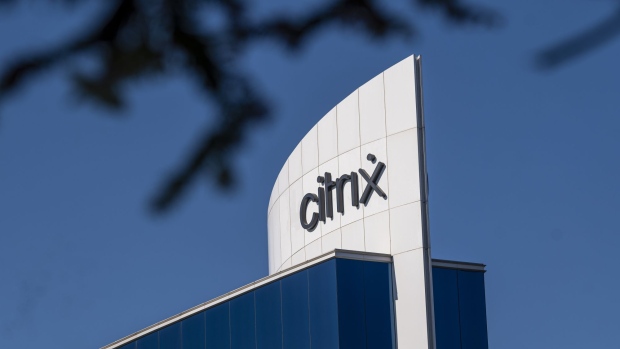Jul 25, 2022
Citrix Bankers Weigh New $15 Billion Debt Plan to Stem Losses
, Bloomberg News

(Bloomberg) -- Bankers backing the buyout of Citrix Systems Inc. are discussing new ways to sell chunks of the $15 billion financing to soften potential losses, including splitting a huge $7 billion loan between themselves, private-credit funds and other investors.
Wall Street lenders, led by Bank of America Corp., Credit Suisse Group AG and Goldman Sachs Group Inc., have pushed back the timing of leveraged loan and high-yield bond offerings to September on the basis that a post-Labor Day market would be more receptive, according to people with knowledge of the matter.
But big changes to the original financing plan may still be necessary in order to reach a broader group of investors as credit conditions remain challenging, said the people, who asked not to be identified because they’re not authorized to speak publicly.
The banks are considering dividing a $7 billion loan -- one of the biggest to be underwritten in recent years -- three ways. The first would include an institutional term loan for managers of collateralized loan obligations and mutual funds, a separate tranche for private-credit funds and a third piece for banks, according to the people.
Discussions among the banks and with investors are fluid and no final decision on how to offload the debt has been made, the people said.
The financing for Vista Equity Partners and Elliott Investment Management’s take-private of Citrix was underwritten in January before a sharp increase in interest rates, while the war in Ukraine and fears of a US recession have caused investors to significantly dial back risk. Lenders that have attempted to offload buyout financings in the current environment have often suffered steep losses to do so.
Read more: Deutsche Bank, UBS-Led Group Hit With $200 Million Buyout Loss
Representatives for Bank of America, Credit Suisse, Goldman Sachs, Elliott and Vista declined to comment.
Moving Pieces
The debt that banks would hold is likely to be structured as a so-called term loan A, which has a shorter maturity and bigger principal amortizations compared to institutional loans. The format is also easier for banks to keep on their balance sheets, the people said. Lenders led by Goldman Sachs and Barclays Plc recently adopted a similar strategy to help finance Clayton Dubilier & Rice’s acquisition of a majority stake in Kindred at Home Hospice from Humana Inc.
In prior conversations with investors, banks have indicated that they may hold onto around $4 billion of unsecured debt -- another part of the financing -- until market sentiment improves further, according to some of the people. Another $4 billion of secured bonds is expected to be syndicated to investors alongside the term loan.
Private Interest
The discussions with private-credit funds have focused on a significant portion of the financing, though the size of the commitments these managers are willing to make has shrunk in recent weeks, the people said. Some have only expressed interest at a steep discount to face value and have asked for stronger investor protections than those banks originally negotiated, according to the people.
Read more: Private Credit Giants Curb Buyout Lending Spree in Big Shift
Vista and Elliott agreed to take Citrix private and merge it with Vista’s portfolio company Tibco Software Inc. in January, in a deal valued at $16.5 billion including debt.
In recent conversations with investors, banks have indicated the combined company would have generated $2.1 billion of earnings before interest, taxes, depreciation, and amortization, after taking into account expected cost savings from the deal, according to one of the people. That compares with Ebitda of around $1.1 billion for Citrix and $500 million for Tibco before the merger adjustments, the same person said.
US loan prices have jumped more than a point over the past week to 93.68 cents on the dollar, but were trading close to par in January. Yields on junk-rated bonds have nearly doubled to around 8% since the start of the year. Both markets have recovered from the lows in recent days, giving bankers some hope that financing conditions might improve further.
©2022 Bloomberg L.P.






